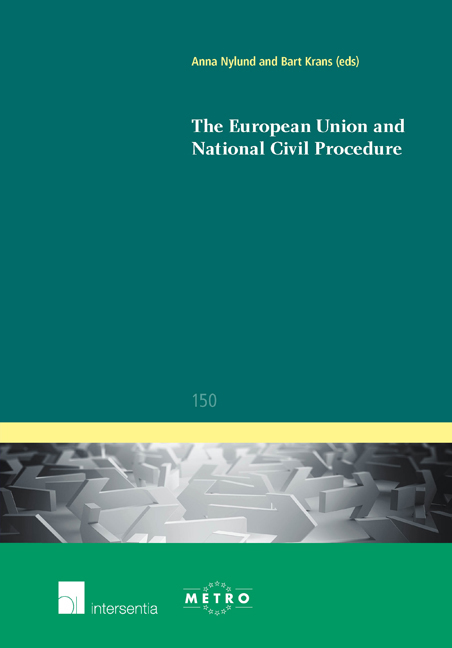Book contents
- Frontmatter
- Contents
- About the Authors
- List of Abbreviations
- The European Union and National Civil Procedure – A Rocky Road or a Smooth Process?
- Some European Challenges for Belgian Civil Procedure
- Danish Civil Procedure and the Internal Market: Impact and Challenges of Sectoral Harmonisation
- European Influences upon English Civil Justice: Tempests or Gentle Breezes?
- European Union and National Civil Procedure: The French Paradox
- The European Union and Civil Procedure from a German Perspective
- Interaction between European Law and Hungarian Civil Procedure Law
- The Impact of EU Law on Dutch Civil Procedure Law
- Norway: An Insider Outside – or an Outsider Inside – European Civil Justice
- Polish Civil Proceedings: How Much Europeanised?
- Slovenian Civil Procedure and the Transformative Power of the EU
- The Curious Incident of the Dog in the Night-Time: Europeanisation of Civil Procedure in Sweden
- Conclusions and Outlook
- Index
- Miscellaneous Endmatter
Danish Civil Procedure and the Internal Market: Impact and Challenges of Sectoral Harmonisation
Published online by Cambridge University Press: 19 December 2017
- Frontmatter
- Contents
- About the Authors
- List of Abbreviations
- The European Union and National Civil Procedure – A Rocky Road or a Smooth Process?
- Some European Challenges for Belgian Civil Procedure
- Danish Civil Procedure and the Internal Market: Impact and Challenges of Sectoral Harmonisation
- European Influences upon English Civil Justice: Tempests or Gentle Breezes?
- European Union and National Civil Procedure: The French Paradox
- The European Union and Civil Procedure from a German Perspective
- Interaction between European Law and Hungarian Civil Procedure Law
- The Impact of EU Law on Dutch Civil Procedure Law
- Norway: An Insider Outside – or an Outsider Inside – European Civil Justice
- Polish Civil Proceedings: How Much Europeanised?
- Slovenian Civil Procedure and the Transformative Power of the EU
- The Curious Incident of the Dog in the Night-Time: Europeanisation of Civil Procedure in Sweden
- Conclusions and Outlook
- Index
- Miscellaneous Endmatter
Summary
Introduction
The EU has increasingly used its internal market competence in Article 114 TFEU to harmonise matters of civil procedure law. Unlike the judicial cooperation competence in Article 81 TFEU, the internal market competence is not confined to cross-border cases. Instead, harmonisation passed under Article 114 is confined to a specific subject-matter. The Intellectual Property Enforcement Directive (2004/48/EC) is the most comprehensive example of such ‘sectoral harmonisation ‘ of procedural matters. It concerns ‘measures, procedures and remedies necessary to ensure the enforcement of intellectual property rights’ (Article 1), and it applies both to cross-border and domestic disputes concerning enforcement of IP rights protected either by EU law or by national law (Article 2). Other examples are the Consumer Injunctions Directive (2009/22/EC replacing Directive 98/27/EC), which concerns injunctive relief in certain cross-border situations, and the Antitrust Damages Directive (2014/104/EU), which concerns certain actions for damages for infringement of competition law rules and, inter alia, lays down rather detailed rules on disclosure of evidence.
When the Commission presented its proposal for the Enforcement Directive, prominent European academics voiced their concerns about the effectiveness and desirability of inserting EU law principles aimed at enforcing IP rights into parts of national procedural law that are otherwise not limited to IP disputes, emphasising that the Directive involved several complex and sensitive matters. In the Nordic countries, some academics were particularly concerned that the Directive would result in a significant fragmentation of domestic civil procedure law, which would increase complexity and legal uncertainty. Academics also criticised the Enforcement Directive for focusing too much on law enforcement and thereby disregarding the fact that civil procedure rules function as a balancing instrument to achieve civil justice and that an unbalanced ‘enforcement approach ‘ to questions of civil justice might increase abuses of process.
The deadline for implementing the Enforcement Directive expired almost ten years ago. Since then, the Commission has made several consultations on how the Directive has improved the enforcement of IP rights, whereas the impact of the Directive on national civil procedure seems to have attracted little (if any) attention.
- Type
- Chapter
- Information
- The European Union and National Civil Procedure , pp. 17 - 30Publisher: IntersentiaPrint publication year: 2016
- 1
- Cited by



